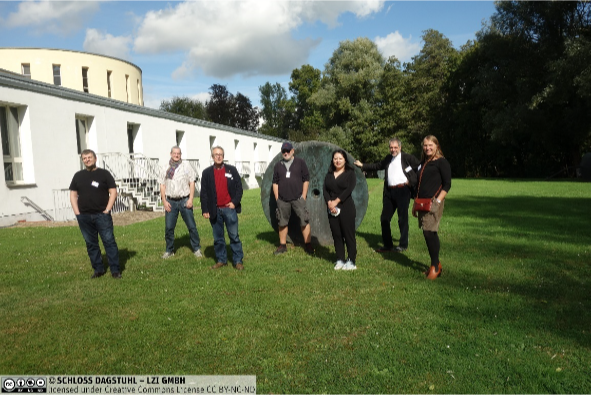Schloss Dagstuhl – Leibniz Center for Informatics,
27 September – 1 October, 2021, Wadern, Germany
 A workshop on the use of metadata standards to support cross-domain data sharing was held at the internationally renowned computer-science institute in Wadern, Germany. It was a “hybrid” event, including both on-site and remote participants. The event was sponsored by CODATA (the Committee on Data of the International Science Council), and the Data Documentation Initiative Alliance (DDI), and subsidized by Schloss Dagstuhl; it was organized by Arofan Gregory (Chair, DDI-CDI Working Group, DDI Alliance), Simon Hodson (CODATA), Hilde Orten (Norwegian Centre for Research Data and DDI Alliance), Joachim Wackerow (GESIS – Leibniz Institute for the Social Sciences and DDI Alliance). The workshop brought together 17 participants from 8 countries and many different domains, including members of relevant standards bodies and data-sharing initiatives and experts representing the use cases which served to focus the work.
A workshop on the use of metadata standards to support cross-domain data sharing was held at the internationally renowned computer-science institute in Wadern, Germany. It was a “hybrid” event, including both on-site and remote participants. The event was sponsored by CODATA (the Committee on Data of the International Science Council), and the Data Documentation Initiative Alliance (DDI), and subsidized by Schloss Dagstuhl; it was organized by Arofan Gregory (Chair, DDI-CDI Working Group, DDI Alliance), Simon Hodson (CODATA), Hilde Orten (Norwegian Centre for Research Data and DDI Alliance), Joachim Wackerow (GESIS – Leibniz Institute for the Social Sciences and DDI Alliance). The workshop brought together 17 participants from 8 countries and many different domains, including members of relevant standards bodies and data-sharing initiatives and experts representing the use cases which served to focus the work.
The workshop introduced an emerging idea that a “common interoperability framework” could be defined, representing a common set of techniques of exchanging data and metadata across domain boundaries to promote understanding and reuse, allowing for a shared expression of otherwise domain-specific information. Four use cases were then analyzed to explore this idea. The use cases included the European Social Survey (ESS) Multi-Level Application and its use of contextual data from other domains; the UK Smart Energy Laboratory (SERL), which combines household survey data, smart meter data and climate data; the European Commission’s Interstat project, using the Next Generation Services Interfaces – Linked Data (GNSI-LD) to provide statistical data from official sources to users of all types through the Connecting Europe Facility (CEF) Digital programme; and the Helmholtz Metadata Collaboration (HMC) prototype for sharing data among the Helmholtz research infrastructures. A parallel workshop was conducted in Australia at the same time, looking at the topic of FAIR vocabularies, and the results of the two workshops will be combined as appropriate after discussions during the week.
The work was organized around small working groups focused on the use cases, with experts in the use cases and experts in relevant subjects joining the group. Some participants attended virtually, while others were present at Schloss Dagstuhl. Communications were facilitated by the new audio-visual facilities provided by Dagstuhl. While this unfamiliar format was sometimes challenging, good progress was made.
A core deliverable describing the findings of the use cases and implications for the idea of a common interoperability framework was planned, and the drafting started. This includes coded examples of the implementation of DDI-CDI for the Interstat and HMC use cases, and draft process diagrams for the ESS and SERL use cases. Discussions were held regarding possible further publications and activities, including how findings could be effectively communicated to the various initiatives focused on cross-domain interoperability, within open science clouds and similar efforts.
The workshop was one of a continuing series of workshops held at Schloss Dagstuhl, in which issues regarding data sharing and interoperability – with a focus on standard metadata – are explored. These workshops form a key component of the ISC CODATA Decadal Programme on ‘Making Data Work for Cross-Domain Grand Challenges’. Other workshops in this series were held in 2018 and 2019 at Schloss Dagstuhl.
Details regarding the event can be found on the Schloss Dagstuhl site, and on the DDI Alliance Workshop page in Confluence.
